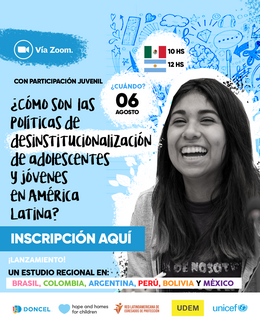Evidence shows that in most countries in Latin America, the quality of alternative care is poor. At the same time, quality is determinant in the wellbeing of children and adolescents living in institutional care and in the support they receive when leaving care.
This webinar builds up on the results of the research More Autonomy, More Rights (2020) Coordinated by CSO Doncel, in the representation of the Latin American Network of Care Leavers and supported by UNICEF LACRO and Hope and Homes for Children. The study aimed to build knowledge on the actions in support of the social inclusion of adolescents and young people in the transition from residential alternative care to independent living in 6 Latin American countries (Argentina, Bolivia, Brazil, Colombia, México and Perú).
This research brings a deeper look into the situation of children and adolescents ageing out of child protection systems and starting independent life. It responds to the lack of evidence on the lives and experiences of children and adolescents who live in and leave the protection system when they reach the age of majority and places the importance of empowering them to participate in the policies and programs affecting their lives. They tell us about their lives in institutions and they describe their transitions into independent living in their own words. Much is revealed about the reality of national protection systems, institutional practices and the experiences of children and adolescents.
Young people from the Latin American Network of Care Leavers will share their insights on the support actions they value the most, and the challenges they faced when living in institutions and leaving care.
This meeting aims to contribute to the discussion on public policies aimed at supporting the transition of youth and adolescents into independent living and invites to reflect on the findings of the research in the new context of Covid-19 pandemic and the renewed challenges that Latin American protection systems face.
Watch a short video describing the research and read the full report.

